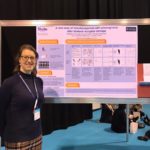We are delighted with the latest paper now out from our lab, which introduces the OCS-Plus, our brief tablet based cognitive screening tool developed to detect subtle changes in domain general cognitive function in memory and executive functioning. Here we present the tasks and provide normative data from 320 and validation and reliability data within this neurologically healthy normative sample. With this important initial step now complete, we are looking forward to further research the validity and usefulness of the OCS-Plus in clinical populations which present with more subtle cognitive deficits.

 Wonderful news and many congratulations to Jacob Levenstein who has now successfully passed his PhD Viva. Even though it was on videocall in these times of COVID, Jacob kindly sent this wonderful Oxford SubFusc picture to share with you.
Wonderful news and many congratulations to Jacob Levenstein who has now successfully passed his PhD Viva. Even though it was on videocall in these times of COVID, Jacob kindly sent this wonderful Oxford SubFusc picture to share with you.
 .
. Up to three quarters of people have visual perception problems after stroke. These problems can be difficulties with recognising objects, faces, shapes or with reading. Unfortunately, only 20% of these problems are discovered in routine clinical practice. This means many stroke survivors and their families do not get support in understanding and managing their visual perception problems. A first step to improving the diagnosis of visual perception problems after stroke is to better understand the current clinical practice and the challenges that clinicians face in making a diagnosis. We interviewed 25 clinicians involved in visual perception screening after stroke. We asked them how they currently screen for visual perceptual difficulties, what they find challenging, and what they would recommend to improve services. They told us visual perception was difficult to understand. For many it was unclear how it differed from sensory vision and visual inattention (or hemispatial neglect). They told us the biggest challenges were a lack of time and training. Many of the existing assessments were not suitable for stroke survivors with communication difficulties or with difficulties concentrating for more than 10 minutes. To improve services, they recommend:
Up to three quarters of people have visual perception problems after stroke. These problems can be difficulties with recognising objects, faces, shapes or with reading. Unfortunately, only 20% of these problems are discovered in routine clinical practice. This means many stroke survivors and their families do not get support in understanding and managing their visual perception problems. A first step to improving the diagnosis of visual perception problems after stroke is to better understand the current clinical practice and the challenges that clinicians face in making a diagnosis. We interviewed 25 clinicians involved in visual perception screening after stroke. We asked them how they currently screen for visual perceptual difficulties, what they find challenging, and what they would recommend to improve services. They told us visual perception was difficult to understand. For many it was unclear how it differed from sensory vision and visual inattention (or hemispatial neglect). They told us the biggest challenges were a lack of time and training. Many of the existing assessments were not suitable for stroke survivors with communication difficulties or with difficulties concentrating for more than 10 minutes. To improve services, they recommend:






